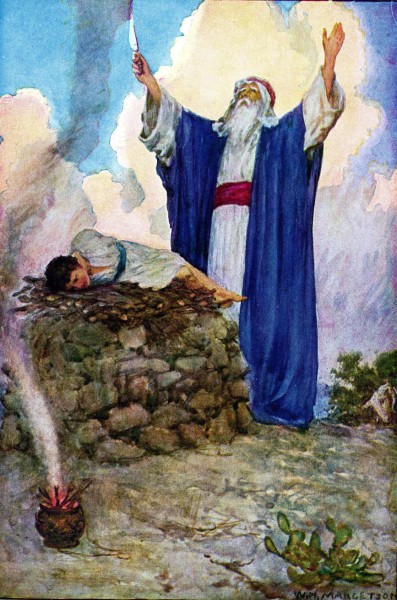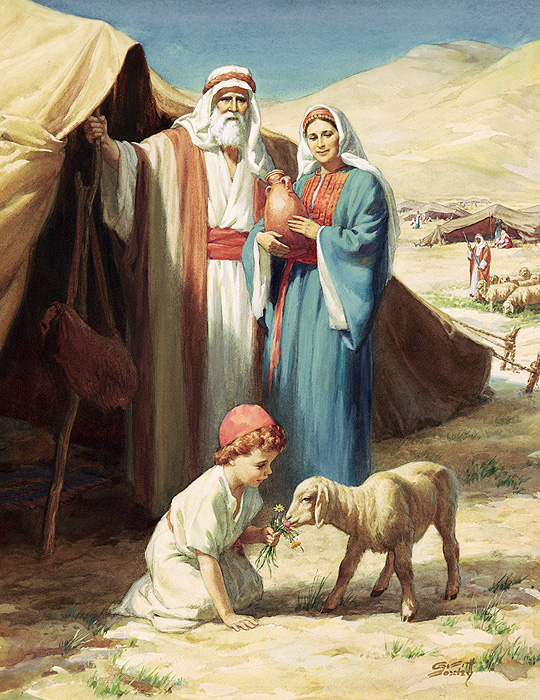GOD DELIVERS HIS PEOPLE
As we continue to look at God’s Story, we focus attention on that glorious time God delivered His people from involuntary enslavement in Egypt. Four Hundred years before, God initiated a covenant relationship with Abram, who needed only to respond with faith and obedience. Abram’s descendants multiplied in Egypt. Those four centuries began with Joseph’s brothers selling him into slavery (Gen. 37) only to see him in a place of keeping others alive (50:20). Famine forced Jacob and his remaining sons to journey into Egypt. Ironically, the brother sold as a slave became by God’s grace the deliverer of Jacob’s family. This movement from enslavement to deliverance is a major theme in God’s Story.
Read Exodus 3:7-10 God Cares
Eventually, Jacob and Joseph died, but their descendants multiplied (Ex. 1:1-14).Feeling threatened, the Egyptians enslaved the people and forced them to work in building programs. When the people cried out (verse 7), God remembered His covenant with Abraham, Isaac, and Jacob, the patriarchs of the Hebrews (2:24). God called Moses to be His deliverer, identifying Himself as the God of the patriarchs (3:6). Thus, God helped Moses see the connection between the covenant He made with Abraham 400 years earlier and deliverance He was about to bring to the Hebrews. The statement of God to Moses was directly related to the statement about God in 2:24-25. The earlier statement told what God knew and was experiencing in relation to the oppression of the Hebrews. This statement builds upon that and sets forth boldly what God has done and will do in their behalf. “I have come down to deliver them… and to bring them” (v.8) sets forth the divine condescension n and its purpose. God, who has been suffering with His people, is now about to do something about it. So God was about to keep His promise. Moses’ encounter with God, as our encounters today, could not be separated from God’s covenant promises to His people.
The description of the land as “flowing with milk and honey” (v. 8) is typical of the Old Testament’s description of Canaan. Such a land would have been the ideal of an agricultural nation who had to struggle for a harvest. This “land flowing with milk and honey” is the land of Israel and Jordan today. This was poetic word picture expressing the beauty and productivity of the Promised Land. However, this territory of Canaan was occupied by both wandering and settled clams of various racial and national origins. The list in verse 8 is not intended to be exhaustive (Gen. 15:19-21; Ex. 3:17; Num.15:29). The list is considered to be typical of the pre-conquest inhabitants of the land. The listing of these different people indicates that God knew He was giving Moses a difficultly assignment and that Moses would need all of the encouragement that God could give Moses. This is the same type of incident we learned that God did with Abram in last week’s lesson. See how God controls His Story! So this tells us that when we get an assignment from God, He will stay with us and provide encouragement. What does it mean to you that God sees and hears our pain? (That He loves and cares for us! David in his writings of the Psalms gives us great examples of how it feels.)
Read Exodus 12:12-13, 29-31 God Judges
Between God’s call to Moses (chapter 3) and these verses in chapter 12, God’s Story is about how He judged the false gods of Egypt with nine of the ten plaques. Pharaoh had remained hardened and unconvinced of God’s power, through these nine plagues, trusting his gods to deliver him. Now Yahweh decided to act in one last decisive plague. None of “the gods of Egypt” could prevent Yahweh’s onslaught. In God’s Story, He alone can deliver people from bondage. The blood was a sign of God’s protection, of His gift of life. As we think about Jesus’ crucifixion, Abram’s sacrifices, and now the establishment of the Passover, blood has always been God’s sign of life. God promised to “pass over” the houses with the “distinguishing mark” instead of passing through them in judgment. For the first time, whether anyone experienced the plague was not a question of nationality or race, but one of faithful obedience. Whoever did not trust and obey would not be spared. In this last plague, as it is today, deliverance became a matter of faith.
There was no way of recapturing the devastation of Egypt on the night of death. The dark stillness was suddenly broken by weeping. Forgetting his wrathful pledge that he would never see Moses or Aaron again, Pharaoh sent for them and in his grief he urged them to depart. Not any of the gods of Egypt had been able to protect their first born. Every first born child of the Egyptians died, but the Israelite children were spared because of the blood of the lamb. How appropriate is this fact to us today? So begins the story of redemption, which is the central theme of the Bible. In Old Testament times, God accepted symbolic offerings. Jesus had not yet been sacrificed obviously, so God accepted the life of an animal in place of the life of a sinner. Jesus’ sacrifice made animal sacrifice no longer necessary. We must recognize that if we want to be freed from the deadly consequences of our sins, a tremendous price must be paid. But we don’t have to pay it. Our part is to trust Jesus and accept the gift of eternal life. Our sins have been paid for and the way has been cleared for us to begin a relationship with God (Titus 2:14; Hebrews 9:13-15, 23-26). The Israelites were learning their need to trust God. We must trust God’s Story all the way to the cross of Christ.
Read Exodus 14:5-6, 13-14, 21-26 God Delivers
Think about what our life would be like if God delivered only judgment and not mercy. We are offered God’s mercy just as was the Israelites. As God’s Story continues, the Israelites will experience God’s continued mercy first hand. Because the Pharaoh decided to go to bring Israel back, he experienced God’s judgment. Pharaoh had not only given Israel permission to go but had ordered them to go. As Pharaoh received reports of the lack of progress on the work that the Israelite “slaves” had been doing, he realized that their departure had done away with the major source of cheap labor. The economic consequences began to sink in and both Pharaoh and his people regretted releasing the Hebrews from slavery. Also upon hearing that the Israelites were wandering aimlessly, the Pharaoh saw his opportunity to pursue them. The Pharaoh’s intent was to capture them and bring them back using a fast moving chariotry that could overtake the Hebrews.
Upon learning the Egyptians were in hot pursuit, the Hebrews were losing faith. Moses showed strong leadership when the Israelites complained against him about leading the out of Egypt. Some had convinced themselves they were better off serving the Egyptians. However, Moses calmed the people by assuring them they would “never see again” the Egyptians and told them they that the “Lord will fight” for them. Moses was introducing the Hebrews to the concept of holy war- the idea that Yahweh, the Lord of all the earth, would intervene on behalf of His people to deliver them from oppression of heathen armies. The “salvation” of which Moses spoke was used in the sense of military victory. The biblical concept of salvation moves forward from this early meaning to the latter one of spiritual deliverance from sin and death. So Moses confidently predicate that God was going to win a mighty victory over Pharaoh and that after this, Egypt would no longer be a problem to Israel.
Why do we sometimes miss “the seas God parts for us”? First, what do you think this means? (It points to the help or solutions that God provides for us.)There was apparently no way of escape, but the Lord opened up a dry path through the sea. Sometimes we find ourselves caught in a problem and see no way out. This story tells us not to panic; God can open up a way. The God who created the earth and water performed a mighty miracle at exactly the right time to demonstrate His great power and love for His people. The God of Israel (our own true God) had defeated the gods of Egypt. God delivered the Israelites and deliverance is an important feature of God’s Story. So God is showing His care for His people, His judgment on those who oppressed His people, and His deliverance of His people. This vital relationship between God and His people serves as the central core of God’s Story, which continues as we enter into this vital relationship of faith.


